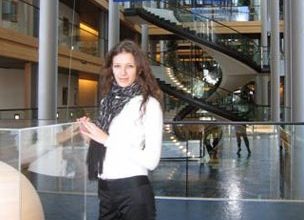How to get a European university diploma in a year
Entry to the master’s program for the 2009/2010 academic year has begun
During your studies, you will have time to bring the foreign language to shine and make new friends
Higher education in Europe consists of two levels: undergraduate and graduate (Master). In undergraduate students study the first three to four courses. And then, if desired, they enter the magistracy (this is another one or two academic years). It is customary to do this right away with us, abroad, young people usually work for several years, and only then continue their education. Master’s program is a serious study of the chosen profession with the writing of a research (diploma) work.
A diploma of a prestigious European university and excellent knowledge of foreign languages – iron trump cards in the labor market. And in the current situation in the economy, it is especially important to have advantages over other applicants for a good position. Be it in a bank, newspaper or at a university department.
You can get a foreign diploma in just a year, that is, with minimal time and money. How? To enter a magistracy! Universities are already accepting documents from those who want to start studying in the fall of 2009. For an example, we chose a master’s program in Spain. Now the question of the ratio of price and quality is especially relevant – during the crisis, no one will be scattered in money. Spanish universities provide a good level of knowledge, their diplomas are prestigious, and the history of higher education is one of the oldest in Europe (the University of Salamanca was founded in 1218). At the same time, the cost of studying in Madrid, Barcelona, or Granada is very affordable.
ADVANTAGES OF MASTERS:
TIME. You will receive a master’s degree in just a year and a half. Accordingly, money for study will go much less than if you gnaw imported granite of science from the first year for five to six years.
AGE. At the age of 18, only children of very wealthy parents or those who won a grant have the opportunity to go to study abroad. At the same time, at least final-year students of Russian universities, most often specialists with work experience, enter the master’s program. Including 35- and 40-year-olds. If you only now realized that you need to go to a new career level and new knowledge is needed for this, your train has not left at all!
CHOICE. There are programs in all specialties – from marketing and the hotel business to interior design or neurolinguistics. At universities and business schools in Spain, you can choose from over 1,700 courses! It is not necessary to study the same science in which they received a Russian diploma. We are ready to accept graduates of the Faculty of History for graduate studies in sociology, international relations, journalism … This, you see, is useful: how many people we have who have studied as a teacher for five years are engaged in advertising, but dream of their candle factory. A master’s program will help both in career development and in a change of profession.
DOCUMENTS
Higher education diploma with application. If you are only graduating from a university this year, an academic transcript. The university may require other documents or invite for an interview. If you enter a creative specialty, you need examples of work. There are no entrance exams for Master programs.
Universities and business schools have begun accepting documents for the 2009/2010 school year in January. It is better not to delay the application, as your papers will be considered for at least 2 – 3 months. Education begins in October, before that you still need to apply for a visa.
LANGUAGE
If you enroll in a master’s program in the UK, Germany, France, one of the required documents is an international certificate confirming that you speak a foreign language (in the case of English IELTS, TOEFL or one of the Cambridge exams, Germans and French have similar tests).
In Spain, when you enter most master’s programs, you will not be asked for any certificate! It is clear that without knowing the language, you will not be able to learn. But this nuance is very convenient. Documents are being submitted to universities now, and studies should begin in October. For 8 – 9 months of training in courses or with a tutor, it is quite possible to bring your knowledge to a decent level. And in a year of study in Spain, you will learn to speak almost like Penelope Cruz with Javier Bardem.
Universities of Spain offer postgraduate programs in English. But in Spanish, the choice is much greater.
An important point for those who want to study in Barcelona, the capital of the autonomous community of Catalonia (and master’s programs at universities in Barcelona are very popular). At public universities, lectures and seminars can be held in both Spanish and Catalan. The ratio is 50 to 50, and every year the share of the Catalan language becomes larger. There are no problems in private universities and business schools in Catalonia: education is in Spanish or English.
PRICE
From 1,500 euros per year at a state university. The fee is made up of many small amounts: for each item, for administrative expenses, etc.
From 4000 euros per year at a private university or business school.
For comparison: a master’s program in the UK costs about 12,000 pounds.
The main expenses of the student are for a hostel or apartment rental and for meals. In this sense, Spain is also profitable: housing, food, clothing, transportation are cheaper than in England or France. And than in Moscow. The most economical option is to rent a room in a student apartment. In Madrid and Barcelona, this will cost 300 – 370 euros per month, in other cities 250 – 320 euros.
Examples of Master programs:
University Program Cost
ESERP Business School (Madrid – Barcelona) Full Time MBA 9000 Euro
ESERP Business School (Madrid – Barcelona) Company Management, Marketing, PR (in Spanish and English) 4900 Euro
INSA Business School (Barcelona) Design and Fashion 3900 Euro
INSA Business School (Barcelona) and the University of Barcelona Advertising 3900 euros
University of Barcelona Master of Culture Management 1,400 euros
University of Alicante International Commerce 5,200 Euro
This post is also available in:
 English
English  Русский (Russian)
Русский (Russian)





